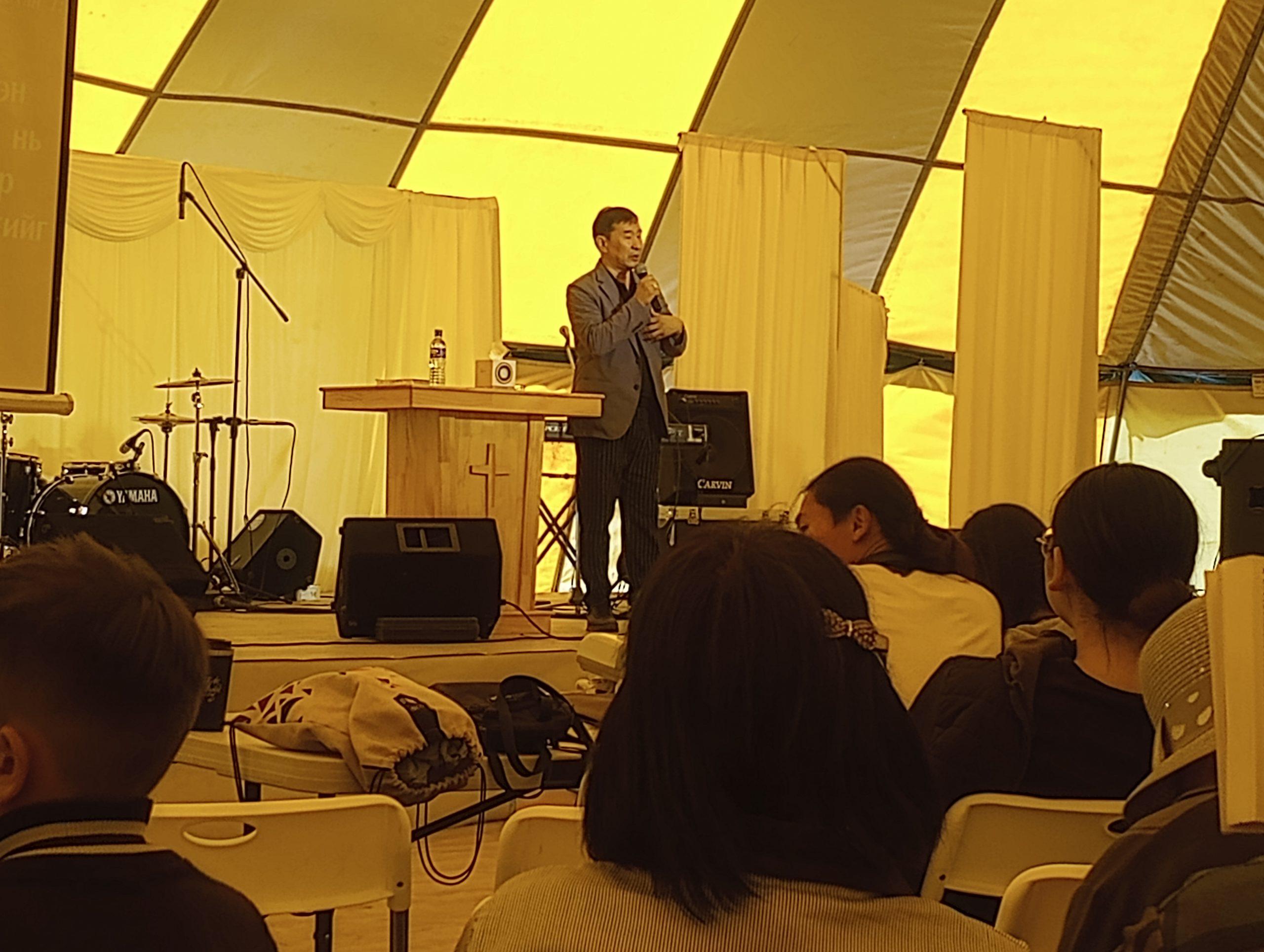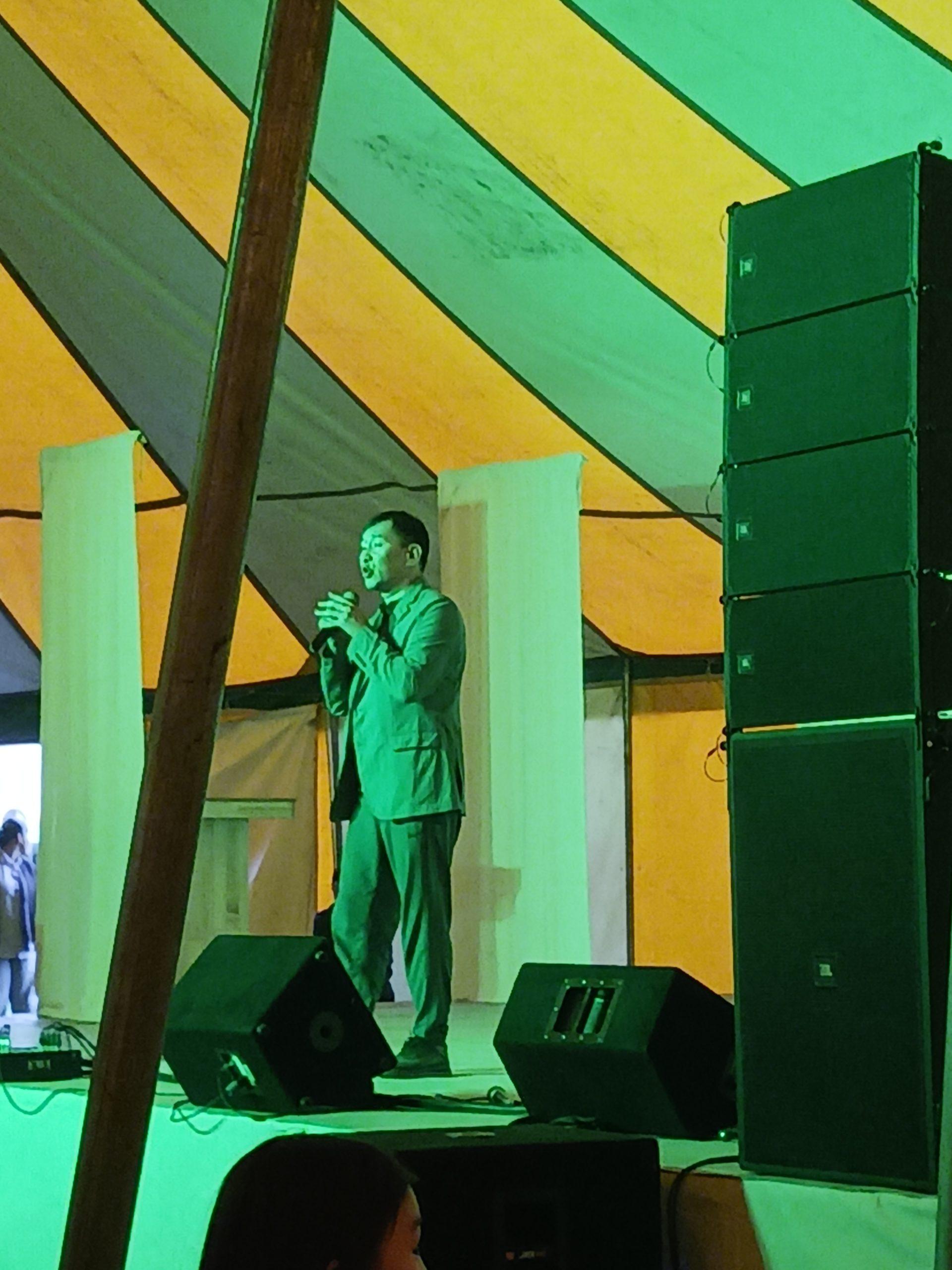An Outlaw’s CaptureNaraa’s Storyby Brian Hogan©2023 Disciple Making Mentors |
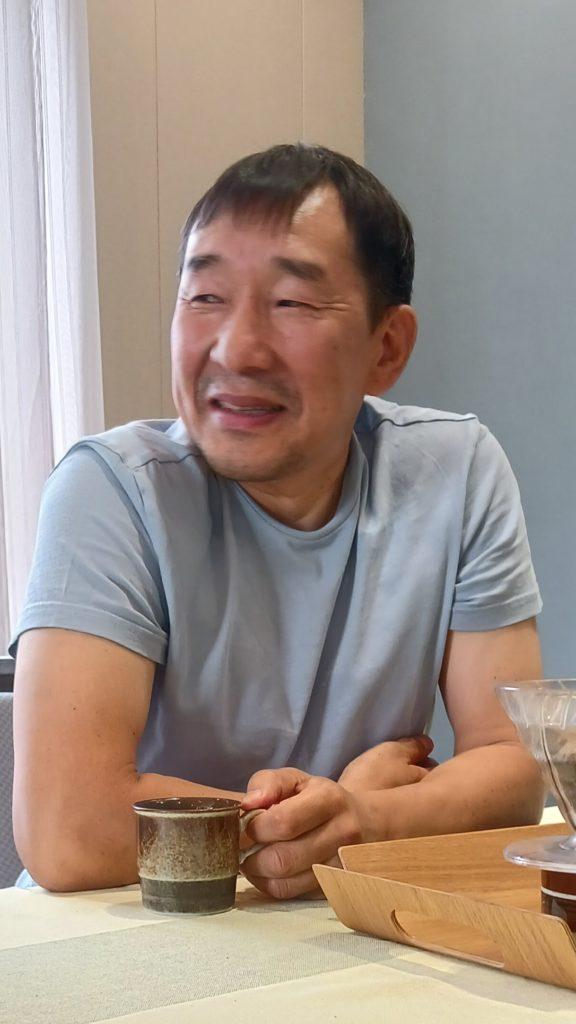
Narmandak D., or Naraa for short, was born in Darkhan City, in the Mongolian People’s Republic on January 30, 1972. He was the seventh child in a family of thirteen children. Sadly, death stalked this family. Three siblings died at birth and two brothers died at the ages of 10 and 13, leaving only eight surviving children.
His father, a good Soviet atheist, considered the deaths to be just bad luck and natural forces, but his mother was a woman who believed strongly in the spirit world of Buddhism and shamanism. She was a frequent practitioner of Mongolian magic, spells and witchcraft. In her desperation, Naraa’s mother consulted a Buddhist Lama (a monk priest of the Tibetan religion) about how to stop the deadly spiritual attacks against her offspring. The Lama blamed it on her husband and said that Naraa’s father had to leave the family home, or the deaths would continue. Upon hearing the prescription, her husband, the materialist, mocked the lama, but with every sick child his wife blamed him. Eventually, he left his family and moved away to try to protect his remaining children.
From a very young age, Naraa believed in the spirit world — curses, blessings, heaven and hell. His mother lived in terror of death and for her children. Her young son, now fatherless at five years of age, was constantly seeking his father. Every knock was a possible return, people on the street of similar size and shape he’d run to in hope followed by crushing disappointment. Naraa began slipping into despair. At one point he ran away to the far-off capital city, Ulaanbaatar, looking for his dad. He soon found himself living mostly on the hard cold streets. He quickly acclimated to life as one of the growing hordes of “street kids”.
Increasingly filled with wrath toward his mom, he was always demanding of her, “Where’s my dad?” He rebuked and blamed her, not knowing the lama’s role and his dad’s decision that leaving might solve the problem. By the age of 11, Naraa was turning for human connection to youth street gangs and became involved in criminal activity.
Over the next four years, he moved up through the ranks in Darkhan’s gangster underworld. He became a violent and terrorizing gang boss by the age of 15. There was another side of his life that could have been a brighter path, had he managed to stay on it. At 15 years, Naraa won first place in the Darkhan City Track and Field Competition. He was sent to compete in the national competition in Ulaanbaatar and took first place there in 1987. Mongolia’s star athlete was sent to Sofia, Bulgaria to represent his nation in Track and Field among all the Soviet countries. He took the gold medal at these International Communist Youth Games and returned home a conquering hero of Mongolia.
Sadly, the success and public acclaim went to Naraa’s head. He thought himself unbeatable in every way and was filled with pride and arrogance. He ended up returning to the Darkhan streets with an inner agenda to assert this new dominance — fighting all comers and creating fear in his neighbors. Society was fraying at the seams. Mongolian (and World) Communism had begun its death throes and Naraa was done with hiding. In a city suddenly filling with the howls of wolves, Naraa was going to be the Leader of the Pack.
In the vacuum created by the collapse of central socialist government, major crime gangs formed in Ulaanbaatar; among them the Kwantung Army and the Blue Wolf Army. Now openly a hooligan (the Mongolian word which means the same thing in Russian and English), Naraa gathered his Darkhan forces and headed to the capital for a showdown with these larger rivals. In a battle of his ten soldiers versus fifty of the enemy, Naraa’s Darkhan boys prevailed by stabbing Ulaanbaatar’s fashionista gangsters with knives. The violent altercations are still memorialized on YouTube (Blood Channel: Darkhan vs. UB Gangs) over three decades later!
In a second battle, a Blue Wolf badly injured Naraa’s close friend and Naraa hunted down the culprit and nearly killed him in a revenge attack. This attempted murder was the last straw for Ulaanbaatar’s exasperated police force. The manhunt for Naraa was on! He escaped capture and made his way back to his home turf. The capital city police followed him home and, united with Darkhan’s law enforcers, who had a long list of crimes they wanted him for as well, joined in the pursuit of the wanted young man. Naraa was on the run for seven months as the noose slowly tightened. Finally, in his hideout at a sister’s home in Darkhan, he was surrounded by a large armed force. They poured into the door and held a pistol to his forehead. “Don’t try to run!” he was told. He briefly considered attempting to escape down a rope he’d prepared for this eventuality but decided that he could not move faster than a bullet. Naraa laughed and submitted to shackles and arrest. His major thought as they hauled him away was discovering the “rat” who’d turned him in. He was already planning a bloody revenge. Later, he learned from the police his mom had informed on him. She felt like prison might be the only way to save his life. His desire for vengeance drained instantly away. It was painfully clear that the Jeckyl/Hyde transformation of the handsome athlete hero to terrible gangster boss was complete.
Convicted and sentenced to four years of hard labor in prison, Naraa now took on a new challenge. He would become the boss of the convicts he was imprisoned with. The worst of the worst!
Prison, however, turned out to be a worse hell than he could have imagined. The fall of Communism, which had allowed him to flourish in the lawless streets, was having a very different impact on Mongolia’s prisons. Big Brother Russia had ceased to support the transitioning economy and the shelves were empty in Mongolian grocery stores. The populace, particularly the city dwellers, were struggling with hunger as they faced empty shelves. The prisons stopped receiving deliveries of any food at all.
On a diet of water soup, a tiny piece of bread, and a few grains of rice a day, inmates soon resembled residents of Nazi concentration camps; skin and bones. When a tiny piece of meat the size of a thumbnail found its way into your soup, it was called “a sheep”. On almost no calories, Naraa worked 12-hour days in a lumber mill, being whipped by a rope wielding guard for slow labor. All of the convicts searched constantly for mice inside their cell block, and cats and dogs when outside the walls. Anything for something to eat.
There were 800 bunks in the building Naraa was housed in; though less and less were occupied as men died of starvation. Lice were everywhere and overwhelming. As Naraa re-shaved his cell mate’s already bald head, the vermin climbed his hand and arm. These conditions continued for five years.
In later years, a friend, himself imprisoned for twelve years, confided in Naraa that bodies in his prison went unclaimed by family. The surviving convicts had to bury them. Too weak to dig the large holes needed, they were forced to butcher the corpses into pieces to fit into the pathetically small frozen graves.
Naraa’s mother managed to visit him a number of times, making the 800-kilometer trip from Darkhan to his prison in Hentii Province. Each time she brought him an item from a lama she promised would help save him and improve his life. Papers with sacred words, stones, some sand from the Buddhist “Mother Tree” . . . Naraa ate the sacred sand out of equal parts hope for help and his ongoing starvation. He believed each of these things would turn his situation around. None did.
Because of infractions while he served his time, Naraa was given a lengthened sentence and stays in disciplinary solitary isolation. Thirty days of torture. The unheated room had ice on the walls, and he had to move constantly and slap his body to keep from freezing to death. His food was reduced to water and a single piece of bread a day. At times, he would be locked to an iron bar that prevented anything beyond a crouched posture and caused incredible pain for three days per punishment.
When he was in disciplinary detention, his mother was limited to a half hour visit for each long journey to the prison. Other convicts got three-day visits. This, and the sight of Naraa’s conditions, broke her heart. After two years she stopped bringing him the blessed Buddhist items — nothing was improving. On a visit in 1992, she brought him a Gospel of Luke and begged him to read it. She had been told reading this book would “make you a good person”. His aunt had been handed it by a street evangelist who told her “This book will fix your life.” She sent it on a long journey with her sister to her bad nephew in prison. With his mother pleading with him to read it and reform his life, Naraa cursed himself for the pain he had caused her. He hated himself and wanted only death. But he felt so sorry and responsible for his mother’s state, he promised to read it. Inside he was laughing at the idea that a foreign book could change his miserable existence.
He started reading. At first it seemed to him a fairy tale. How could such amazing things be true?
After finishing the Book of Luke, Naraa felt that if it was true, then Jesus must be the True God. His extensive knowledge of Tibetan Buddhism, Shamanism, and witchcraft deeds contrasted so sharply with what he was discovering about this Jesus. They were so unlike Him. He is God. Jesus’ character of holy humility was so different from all he had witnessed in human religious figures. It was completely attractive.
After this, Jesus went out and saw a tax collector by the name of Levi sitting at his tax booth. “Follow me,” Jesus said to him, and Levi got up, left everything and followed him. Then Levi held a great banquet for Jesus at his house, and a large crowd of tax collectors and others were eating with them. But the Pharisees and the teachers of the law who belonged to their sect complained to his disciples, “Why do you eat and drink with tax collectors and sinners?” Jesus answered them, “It is not the healthy who need a doctor, but the sick.”
Luke 5:27-31
Reading this passage opened Naraa’s heart wide to faith. The story of Jesus calling and dining with the wicked tax collector, broke through the shame, fear, and guilt separating him from God. Jesus said that it is the sick who need a doctor. It is sinners who need the healing that repentance brings. Nara thought what a great brother Jesus would be to me. He doesn’t hate sinners — sick and dying prisoners, Naraa among them. He seeks them out and heals them. Also, this righteous and pure Jesus speaks and acts with great confidence and authority.
Over the following two weeks, Jesus was calling Naraa over and over, whether working or sleeping. Luke 5:31 began to pop into his head repeatedly, night and day. He would collapse straight into bed after finishing his daily forced labor. Almost at once that verse would wake him up. He found himself getting out of his bunk (in a room of 800 bunk beds and sleeping inmates!) unable to sleep or wrest his thoughts from this wonderful idea. Finally, in exasperation, Naraa demanded of Jesus: “Why should a Mongolian Buddhist believe in you?” All at once, the elusive answers he sought began to flood his mind. He remembers: “I knew I was wicked. I hated myself. I wanted to die. I saw myself as nothing beyond sinful. I was worthless and drowning in shame. My only desire was to hide myself until death came for me. I considered my mind to be so filthy that it would actually reek if anyone could smell it.”
Naraa wondered how a spiritual injury could be cured. An injury to his physical body would need a doctor, surgery, or the right medicine. But what doctor could heal his diseased soul? His broken and bleeding spirit? There needs to be a treatment for thoughts, medication for cleaning a cancerous mind. He knew he would pay any price for help like that, but none was available. He felt completely discouraged and hopeless.
“I am the Doctor who cures your thoughts.” Jesus spoke into his darkened mind. In an instant he saw revealed his prideful, arrogant, fear-filled, and hating heart. Naraa was shocked into silence.
“Naraa, if your heart had a defect, we could operate on it. Who can heal your heart? . . . I AM that Doctor.”
Like a cinema screen coming to life, Naraa saw a movie-like vision of his life. He saw a wonderful childhood, a happy family life, loving parents . . . stolen suddenly by loss, brokenness, separation, divorce, abandonment and crushing unhappiness. He felt pity and sorrow for his younger self. He had never wanted the life he had ended up living. He had never dreamed of being a criminal. Disappointment overwhelmed him.
“If your body was ill, you could get it fixed. Your life is sick.”
“My life is sick.” agreed Naraa, “not healthy at all.” He wished for a doctor, operation, drug; but no such help existed for his dying life. He was without hope!
“I’m your Life Healer!” he heard Jesus proclaim.
This Jesus was the Doctor for mind, heart, and life.
Naraa broke. “I give my life to you, Jesus. Heal me.” The battle was over. The proud gang leader was defeated. The gentle Savior completely victorious. The convict was set free!
This was 1992. Naraa was to spend two more years in prison, growing in his new faith with only the Holy Spirit and Luke’s Gospel to guide him. When he finally walked out the gates — a free man — it was only his body catching up with his spirit which no bars could contain. He left incarceration with no knowledge of the Church. Not having any other ideas, Naraa returned to Darkhan and fell in with his old gangster friends. He didn’t know what else to do. How does one follow Christ in the world outside the walls?
He was infamous in Darkhan City, and he was greeted everywhere with fear and deep mistrust. His sister was an exception. She gave him a complete New Testament. He immediately opened this treasure chest at random and read the first thing his eyes landed upon. Ephesians 5:8 “Do not get drunk . . .” He had already fallen back into drinking since alcohol was available to him for the first time in years. The spot-on verse frightened him, and he slammed the book shut. He prayed, “Teach me, Jesus. Please!”
All his time was idle and spent with his only friends — his mates from the gang. They were a bit older but otherwise, unchanged. They were robbing people on the streets. Naraa began to confiscate the loot and went around returning it to their victims. He told his friends about this New Life — and they began to hate him! They called him crazy.
Finally, Naraa found out about a Christian church in Darhan (The same fellowship the author visited on his first trip to Mongolia in August 1992 when he went to Darhan to show the Jesus Film). He went to their meeting, and it was a wonderful experience. He was shocked by the big, loving welcome with which he was greeted. The kind and loving eyes of the two ushers he met first especially surprised him. He felt complete love and acceptance. What kind of place was this? Where had it been before?
He kept attending and made it clear that he wanted to become a member. Out of an excess of caution, the pastors — knowing well his past — denied him membership. No doubt they felt a probationary period was a safer course. At this, Naraa felt rejected and very lonely. Neither the gangbangers nor the Christians could accept him.
Then a friend in his gang died. Naraa went to the funeral and all his old mob were in attendance. They saw Naraa and their hatred boiled over. He was dragged from the cemetery by five gangsters — friends since grade school. They beat him severely with fists, feet and broken vodka bottles. Injured with multiple bleeding wounds, Naraa realized that his enemy, Satan, was operating and present in his former friends’ hatred. Now he was completely alone. No friend but Jesus.
Into this hard place, a strange compulsion inserted itself. He felt a strong urge inside: “Go to Erdenet.” Erdenet was the name of Mongolia’s third city, home to a huge copper mining operation. Beyond an older brother who worked for the mine, Nara had absolutely no ties to this place. In fact, his visits to his brother’s family had been rebuffed. Before he had taken off his coat and had a welcoming cup of tea, his brother, Ulzii, always asked him, “When are you leaving?’ He made it clear that “Soon” was the only correct answer.
He tried to push the idea away. At one in the morning, he went to bed. “Go to Erdenet!” came again, unbidden, into his thoughts with great strength. He again asked God for specific guidance. Since his beating he had been making this request for seven days. All of a sudden, this sleepless night and repeated command. Could this be his answer?
Erdenet!
He immediately got out of bed and dressed. He rushed over to the Darkhan train station. The train to Erdenet was there from midnight to 3:40 AM every night. He arrived just in time to board the train as it lurched away on a four-hour ride to the city God was calling him to.
When he arrived, he caught a ride into the city and made his way to his older brother’s place. Expecting a cold welcome, Naraa was shocked when he was greeted with joy. Ulzii was happy to see him! His hard-drinking brother was a changed man. He had met Jesus and he and his family were following Christ.

In fact, they were active in the Erdenet Church, Jesus’ Assembly. They were about to launch a house church gathering in their apartment and Naraa was able to become a member from the beginning of the small group in January 1996. (Unknown to any of the believers in Erdenet, at this very time the foreign missionary team — the apostles who planted this church meeting in multiple house churches three years earlier — were just coming to the decision that their task was done. The church was being led by Mongolians now and it was time to begin the teams’ exit).
Naraa plunged into Body life in Jesus’ Assembly. Though a few believers had heard of his past as a gangland boss and convict and were a bit afraid at first, Naraa found a real family in this fellowship. He remembers floating in love, acceptance and connection, as he joined in house church, service as an usher for the Celebration Meetings in the city movie theater, and training opportunities (like the brand-new Disciples’ School). He took a deep dive into ministry from the very beginning. He learned quickly how to obey the simple commands of Jesus: to LOVE God by repenting, believing and receiving the Holy Spirit daily; baptizing; talking to God; and to LOVE others by breaking bread; giving generously; and making disciples. Naraa was discipled in a way that would last for eternity.
He confirmed his new life with public baptism on February 23, 1996. Fifty-one of Jesus’ sheep went beneath the water in a home church bathtub baptism that day, and Naraa was among them. As they were washed by the waters of baptism, Naraa marveled at two things. The shining and joyous face of each brother and sister as they came out of the tub, and the flooding of the floors and dinginess of the bathwater that increased with each plunge!
It was this same month that Naraa’s mother visited Erdenet. Tsagaan Sar, or Herdsmen’s New Year, is the major festival of the Mongolian calendar (imagine combining Christmas and Thanksgiving). She had to visit and feast with her older brother, Naraa’s uncle, who also lived in Erdenet. This man was a harsh Communist Army officer and would be predictably very drunk at the Tsagaan Sar table. Naraa had no choice about attending; culture and family responsibility made it imperative. This being his first Tsagaan Sar as a believer he was really nervous. There was no way to avoid being forced to drink in this situation.
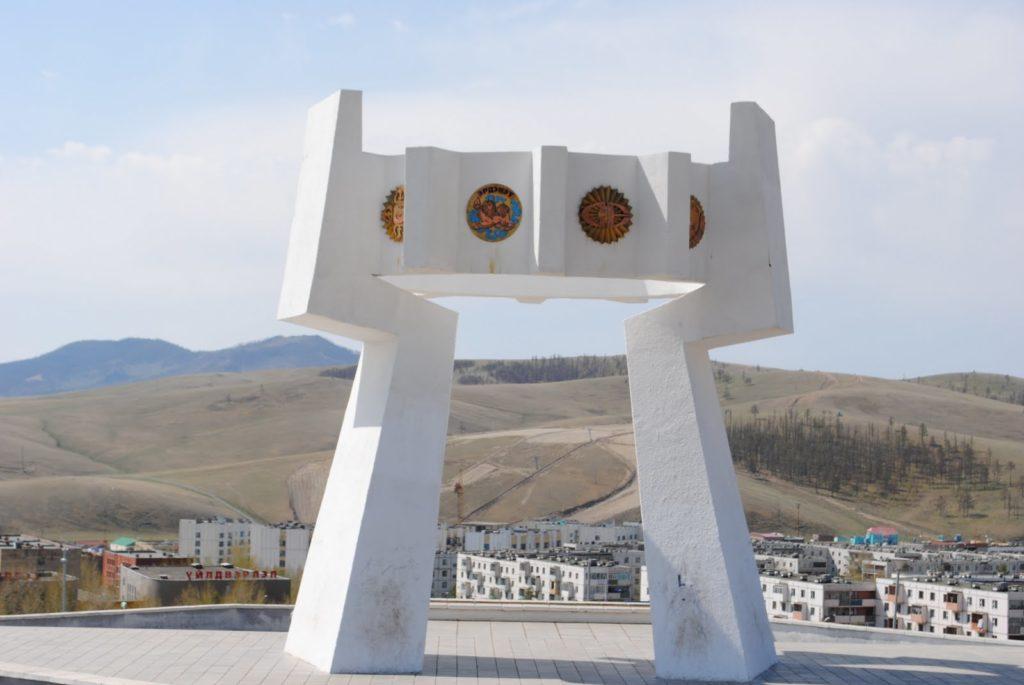
His mother brought the entire family from Darkhan for the holiday. She, though still not a believer, was invited by a group of elderly church ladies (who were part of a group of older believers that we had formed to be a sort of advisory council to the mostly young church leaders). They were going up to the monument on the hill overlooking Erdenet to pray over the city for the holiday. This monument was a huge concrete pair of hands holding aloft a gear in celebration of Mongolian-Russian Industrial Friendship. However, the young church saw it as two hands crowning Jesus as Lord and King over Erdenet. It had become the logo of Jesus’ Assembly. Naraa’s mom, the witch-woman, went happily along with the group of intercessors and Naraa, curious at this, joined them. He was feeling very ill-at-ease that drinking was still an unsettled issue in his life and here he was — about to enter a multi-day festival in which pretty much everyone was under extreme pressure to drink to excess. Vodka toasts at Tsagaan Sar feasts were numerous and mandatory. The social pressure applied was unbelievable. He was terrified that the first three shots would lead to more. It was a very real possibility that his feast might end with being awakened, handcuffed and under arrest. Naraa was not the only young believer heading into this storm with fear and trembling, begging God for protection and guidance. Culture and faith were on a collision course.
Naraa stood under the monument to King Jesus and implored his King and Lord for help in the coming celebration. “Jesus! Protect me from drink!” He prayed on the hill from six to eight in the evening, long after the cold winter day had fallen into darkness. It was far below freezing, but he was too intent on finding God’s path forward to notice.
His whole family walked together to his uncle’s home, where the table was laden with a whole sheep and the rest of the sumptuous feast. Naraa was praying silently and constantly. He HAD to respect his elders, his uncles and others, and he didn’t want to drink any vodka at all. For him there was no such thing as a little drink. It was an impossible situation. His uncle barked a command at him to fill the glasses with vodka for all. He dared not refuse. As he filled the first large cut-crystal tumbler really full there was a loud clank of glass. This scared Naraa and all the rest around the table. He thought he saw, in an instant, a white-robed person hit the glass with a sword. The bottom of the glass fell off and the vodka seemed to pour out onto the table in slow motion. Everyone reacted in shocked fear. Naraa boldly proclaimed in faith, “I can’t drink now. God will not allow it!”
The family examined the now bottomless glass. They expected a jagged dangerous edge. They were amazed to find a clear perfect cut on the bottom — as smooth as the lip at the top! Naraa’s uncle, the proud atheist, immediately professed faith in Christ and stopped drinking. Naraa’s mother stubbed out her cigarette – her last after smoking her entire life — and gave her heart to Jesus. She never again practiced witchcraft. Today, she is 84 years old and an elder of the church in Hongor, a suburb of Darkhan. It was a joy to watch and hear her give testimony before hundreds in a tent meeting in the Zavkhan Provincial capital, Uliastai, at the end of June 2023. 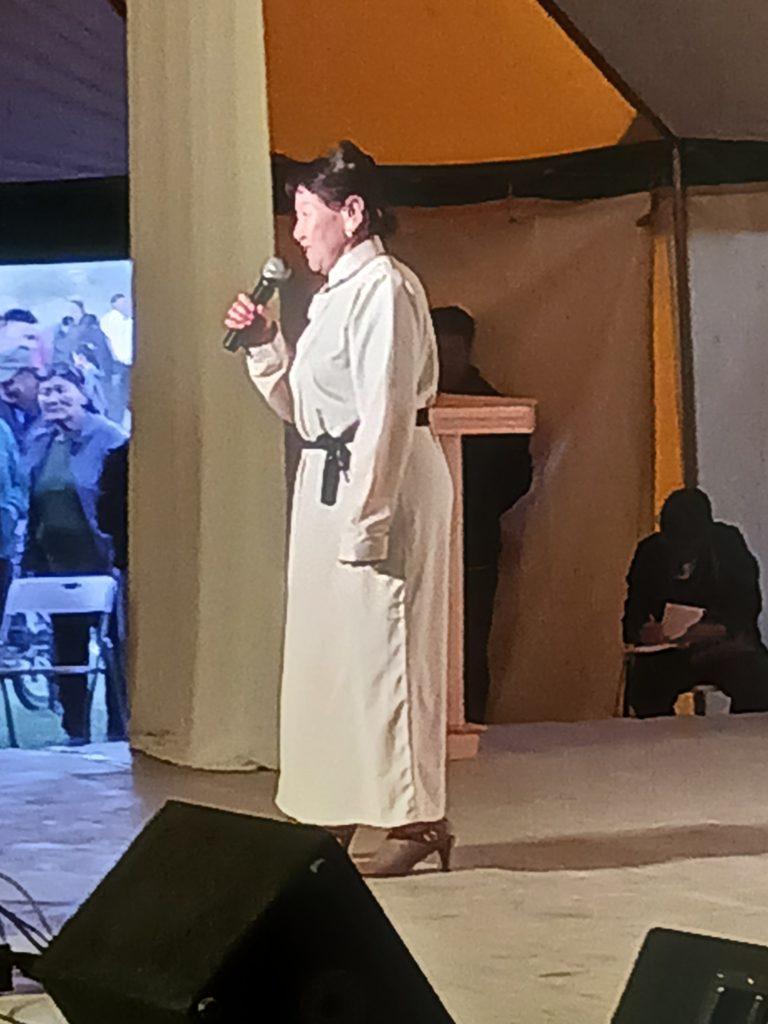
Very rapidly, Naraa’s entire family followed mom, put their faith and trust in Jesus, and were baptized.
After Naraa completed Jesus’ Assembly‘s Disciples’ School, he studied for a year at a Bible School in Abakan, Siberia. Upon his return to Erdenet in 1997, he was asked to go to Darkhan and pioneer a new church plant there. Amazed that his new family in Christ would entrust him with such a task, he still had a strong desire to refuse this call. He wanted to go somewhere really hard. Somewhere that martyrdom was a serious possibility, like Afghanistan. Darkhan? His hometown and the cesspit he had swum in for so long? A terrible idea! His reputation there was as black as tar. There was also a practical obstacle. The police would have an easy target for many unsolved crimes. He could be falsely accused and arrested for every act they had no culprit for — even reimprisoned. He had serious concerns that his old ways, so well-known there, would bring shame upon the cause of Christ. He already knew from experience that he was still hated and feared by the citizenry, and in actual danger from his old gang. Even the believers there had failed to fully accept his conversion.
Amid his doubts, the Lord showed Naraa the man known as Legion. When delivered of his host of demons, Jesus had told him to stay in his home place, Gadara. So, Naraa submitted to the Lord’s seal on this request of the Erdenet leadership. He obeyed and moved back to Darkhan. To his surprise, Jesus received much glory for the changes in Naraa’s life — so much more obvious to those in his hometown!
He had begun a cautious courtship with Baagii, a beautiful young woman, one of the first fourteen teenaged girls to believe and be baptized in Erdenet — the “Mothers of the Church”. Baagii had been told about Naraa as she studied in Siberia, the year before he went there. She prayed for him for six months before ever laying eyes on him.
Baagii was also sent to Darkhan on Naraa’s team. She’d always thought Naraa was exaggerating his past misdeeds. He was too good and nice to have been the monster he described from his pre-Jesus past. When they arrived in Darkhan, the truth of his tales was borne out again and again. The peoples’ reactions to him convinced Baagii that her boyfriend had not embellished a thing. One woman recognized him as they were walking and holding hands. She stared in horror, eyes bulging in fear as they passed. She locked her vision on them so intently that she actually fell to the grounds as she twisted to watch them without moving her feet! On another occasion, Baagii was buying a fish from a vendor and about to pay when Naraa joined her. The frightened fish monger quickly handed her the fish and said, “No charge for Naraa. Please take it!” Naraa answered ‘I’ll pay it.” Then he hopefully added, “I heard you changed?”
Naraa and Baagii were married in Darkhan on August 15th, 1998. 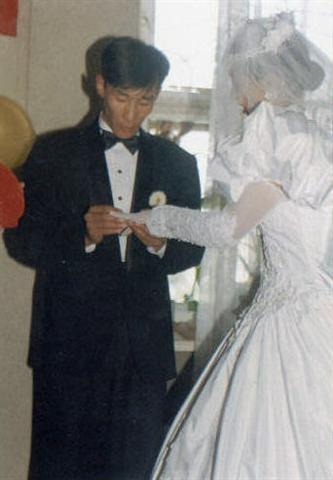 A few days after the wedding they went to the shopping center as a newlywed couple. They saw a large gang lounging around. Naraa held his wife’s hand. A woman with whom he had close relations in his past was walking toward them and had not yet recognized Naraa. Remembering his shameful past, Naraa’s heart shriveled, and he dropped the hand of his bride. He just wanted to escape and hide himself. Then, the Holy Spirit comforted him with a verse he’d memorized in Erdenet:
A few days after the wedding they went to the shopping center as a newlywed couple. They saw a large gang lounging around. Naraa held his wife’s hand. A woman with whom he had close relations in his past was walking toward them and had not yet recognized Naraa. Remembering his shameful past, Naraa’s heart shriveled, and he dropped the hand of his bride. He just wanted to escape and hide himself. Then, the Holy Spirit comforted him with a verse he’d memorized in Erdenet:
Therefore, if anyone is in Christ, he is a new creation. The old has passed away; the new has come.
2 Corinthians 5:17
The old was passed away! Gone! He was a new creature in Christ with a brand-new life! Naraa grabbed Baagii’s hand and greeted the woman from his past with assurance and authority. She recognized him in shock, and he took the opportunity to invite her to their church.
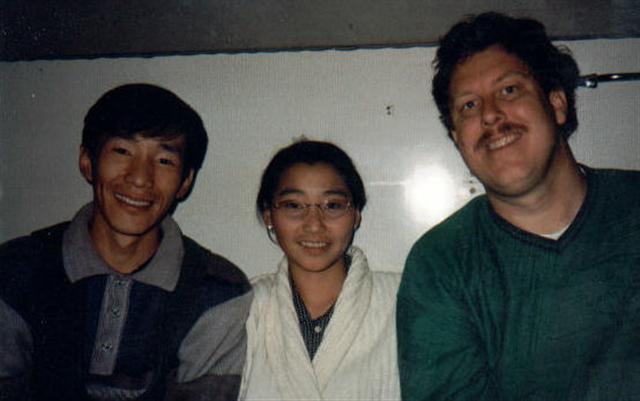
The author met with Naraa and Baagii on a visit to Mongolia two and a half months after their wedding. They came aboard my train as it made its stop in Darkhan enroute to Erdenet. We had three blessed hours catching up with each other. They shared their wedding album, but only after reporting on their year-old church plant. Their church was already 100 strong and had several outlying daughter churches planted (including the one where Nara’s mom serves today). They were in the middle of an outpouring of God’s Spirit accompanied by signs and wonders. I was floored by the speed and effectiveness of their apostolic ministry. They told me they were simply following my example and applying what I had taught them to do.
Naraa and Baagii trained up leaders for the church in Darkhan and passed the baton of leadership to those faithful local men and women. In this, they followed the apostolic model they’d seen back in Erdenet. In five years, they planted five churches. In 2005, the young and growing family moved to Ulaanbaatar. They ministered from that central location to rural Mongolian church leaders, mentoring these men and women and their families. They would spend three months in concentrated discipleship and training with each family.
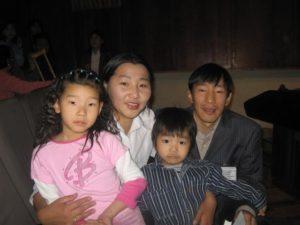
In the beginning of 2005, they were called to something new. Naraa and Baagii and their two children (a son and daughter) settled down in Ulaanbaatar and planted a church there. The Kingdom of Jesus Church is gifted in intercession and worship and ministers to the larger Church of Mongolia. Many of their old Erdenet friends minister there with them. The central location facilitates ministry to the entire Mongolian Nation. Baagii and Naraa’s church planting ministry continues into third and fourth generation multiplication. Naraa is also the founder and chairman of Mongolia Care Ministry, an NGO providing mercy ministry to poor, ill, and imprisoned Mongolians.
Naraa related a final story that I found inspiring. In 2010, he received a visitor from his hometown. This man, a fellow pastor in Darkhan, brought a report of a recent happening.
The Police in the city were alarmed at a huge upsurge in alcoholism and drunken crimes. The Police Chief called all the city’s religious leaders together, including every Christian pastor. He described the problem and told them he needed their help in finding a solution to the crisis. How can we partner to fight this scourge? A widely known and respected Buddhist lama offered the first suggestion. He said that many women came to his monastery begging for help with their alcoholic husbands.
“I send them all to the Christian churches,” the lama said.
“Why?”, demanded the Chief of Police.
“I know Naraa. I saw how he changed completely. There is an answer there,” replied the leading monk.
As a result of this gathering, Christian leaders in Darkhan were given permission to visit the prison twice a week to bring the Good News to these lost and damaged men, so in need of a Great Doctor.
— Brian Hogan, pioneer church planter in Erdenet, Mongolia, 1992-1996.
Author of There’s a Sheep in my Bathtub: Birth of a Mongolian Church Planting Movement

